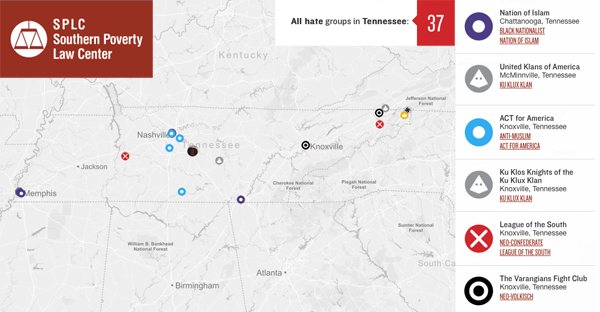
In the 1950s, Sen. Joseph McCarthy and others led a movement to blacklist, shun and silence many Americans by labeling them “communists.” Today, many historians and observers looking retrospectively on this time period view the era of McCarthyism as a time of paranoia, a political witch hunt and a dark time in American history as far as freedom and political discourse are concerned.
Today, many seem to see such terms as “racist,” “hatred,” “bigot,” “Nazi” and “homophobe” as mic-drops of sorts; that when they play those trump cards and accuse the other party of racism, hatred or bigotry, the discussion is over and they have ultimately ceased to consider any aspect of the other’s point of view as valid.
Others see these insults directed towards the “intolerant” as a new form of McCarthyism, intended more as a method to silence political adversaries and invoke hysteria rather than engage in any real political dialogue.
One organization of note helping perpetuate this movement of social patrolling and public shaming of the racist bigots is the Southern Poverty Law Center, an Alabama-based civil rights advocacy group with a $300 million endowment, perhaps best known today for its cataloging and criticizing of what it calls “hate groups.”
The SPLC currently includes over 900 organizations on its “hate group list,” saying these entities “vilify others because of their race, religion, ethnicity, sexual orientation or gender identity.”
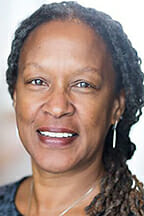
Lecia Brooks
Lecia Brooks, Director of Outreach at the Southern Poverty Law Center, recently visited the Middle Tennessee State University campus as the keynote speaker for MTSU Scholars Week, a presentation co-sponsored by the Distinguished Lecture Committee and the English Department.
“You can act and be anything,” Brooks told the audience encouragingly. “You are in charge of your life.”
Most of her speech that followed focused primarily on the SPLC’s list of hate groups in the U.S.
Brooks proceeded to make the case that intolerance and division along racial lines, particularly white nationalism, is on the rise in America.
As evidence of this, she displayed imagery of some spray-painted swastikas and groups of angry pale-skinned, tiki-torch-bearing college students, some chanting “Jews will not replace us.”
Furthermore, Brooks contends, intolerant Americans may very well strip away freedoms protected by the Civil Rights Act of 1964 if the Supreme Court defends the right of a baker to decline making a wedding cake celebrating a same-sex couple.
Brooks will insist that modern college campuses are hotbeds of white nationalism one moment, almost leading one to believe that, thanks to powerful groups of hateful young white men, the nation is on the brink of a cultural upheaval on the scale of Nazi Germany, or ISIS in the Middle East. But then the next moment, she downplays the influence of these radical groups, painting many of them as loosely organized and poorly led organizations that hang some flyers on college campuses, make some Twitter posts and then fizzle out.
She brought up Richard Spencer, labeled by the SPLC as an “academic racist” who gained wide notoriety as a white supremacist leader over recent years, but then noted his last round of college appearances had trouble attracting very many attendees and that he has since cancelled his college campus tour.
Brooks laments that the socioeconomic status for blacks is the same today as in the 1960s and that they still do not hold positions of power in modern American society.
Does she remember who the last president was?
Brooks touched on the out-of-control prison, probation and legal system in the U.S.A., and the poor relationships between some law enforcement agencies and many communities around the country.
Though if the force holding down minorities in our country is the government’s own criminal justice system, then why does the SPLC not focus its efforts in that direction more forcefully, rather than towards The Remnant Press, The American Security Rally of Montana, ISD Records, The Pray in Jesus Name Project, Oregonians for Immigration Reform, The American Guard and other obscure groups on its hate list that have a much smaller impact on mainstream America? Are these the groups responsible for setting up a system that keeps about 7 million Americans either locked up or on probation (including a disproportionately high rate of African Americans)?
Brooks emphasizes the importance of tolerance and acceptance, and suggests that you can be proud of who you are and what you believe without having to degrade or otherwise put down others, but then lets the insults fly towards those with whom she disagrees.
According to Brooks, President Trump is “hateful,” Attorney General Jeff Sessions is an “asshole,” French politician Marine Le Pen (who draws some comparisons to Trump with her opposition to illegal immigration, the sovereignty of her nation, and suggestions that France should withdraw from the European Union) is a “Nazi.”
Regarding the state of Tennessee, Brooks commented “you all are the worst as far as Islamophobia.”
Some may take exception to such a sweeping generalized stereotype of an entire state containing 6 million people—let’s not vilify others based on their geographic location, right?—but many in the crowd at the MTSU presentation seemed to enjoy Brooks’ remarks.
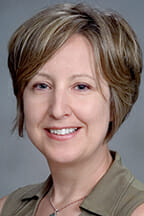
Dr. Laura Dubek
The MTSU English professor who organized the visit, Laura Dubek, herself acknowledged that Brooks is often “preaching to the choir” at many of her public appearances.
Dubek said she wanted to promote a spirit of “we’re all in this together” with Brooks’ visit.
But does the Southern Poverty Law Center share that belief?
If we are all in this together, why are so many statistics divided along sub-group lines?
Why is the SPLC obsessed with breaking down statistic after statistic into how many Hispanic people are victims of hate crimes, how many kids of Asian descent are in the public school system in the U.S., the percentage of non-binary-gender-conforming people residing in rural areas in the U.S., and so on?
That is not a sign of “one nation united” and “we’re all in this together.” That is a sign of division, of pitting one group against another, of conflict, of us against them. Are we all Americans, with equal rights, judged not on the color of our skin but on the content of our character, or does the SPLC want to “Make America Segmented and Segregated Again”?
Those in Murfreesboro will recall that in October 2017 some groups associated with white nationalism decided that they would have a White Lives Matter rally on the Murfreesboro Public Square.
In the weeks leading up to the event, sensationalized media reports based primarily on information coming from the Southern Poverty Law Center regarding the participating groups fueled the Antifa folks to encourage one another to come on down and punch a Nazi and bash a fascist—“the only way to fight hate is with more hate,” as Eric Cartman says. The subsequent name-calling and anger spiraled out of control until the Murfreesboro community determined the only possible course of action was to institute a militarized lock-down of the Square for the weekend.
What else should we do? Talk to those Nazi bigots as people?! Listen what what they have to say and consider why they behave in such a way?
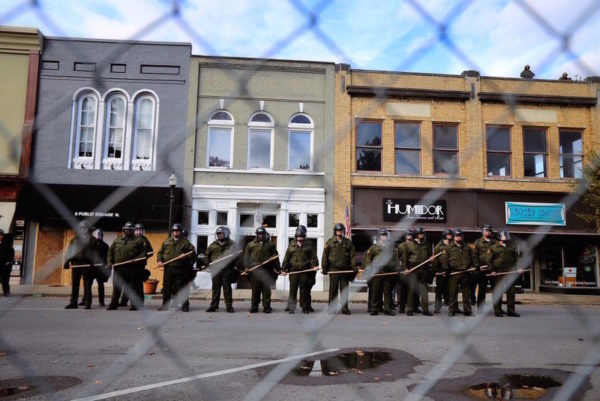
photo courtesy of nashvillepublicradio.org
Regardless of who was responsible for what, most of those who own property and run businesses in the downtown Murfreesboro area did not regard that weekend as an overly positive thing for the community, and some do not find the recent trend of labeling those with opposing political and social views as hate groups, Nazis and bigots as a positive or constructive thing for our culture or rational political discourse, or something to be encouraged at an institution of higher learning, particularly when this labeling is, admittedly, a matter of opinion.
“Our criteria for a ‘hate group,’ first of all, have nothing to do with criminality, or violence,” former Southern Poverty Law Center Senior Fellow Mark Potok has said. “It’s strictly ideological.”
If the SPLC continues its efforts to divide, not unite, to alienate and ostracize, not welcome and accept, it could very well find itself on its own “hate group” list.
Many Americans hold a wide range of views on immigration, on society, on economics, on marriage, on media, on what types of bathroom facilities a government building should be required to provide and on a host of topics that do not line up with those of the SPLC; complex views and topics that cries of “bigot” and “hate group” cannot adequately describe.
I suggest that engaging in conversation, listening to the views of others, asking them why they feel that way and replying in a respectful and detailed way rather than shouting “hatred,” may be a better method to reinforce the notion of “we’re all in this together.”
I have no loyalty to the Republicans nor the Democrats. I would probably encourage voters to select someone other than a Republican or a Democrat in any election possible, and I do not place too much hope in either of the mainstream parties to do much of value. (This is one of the moments where I can proudly say that I voted for neither Hillary nor Trump.)
But particularly those who oppose Trump and the Republicans perpetuate this dismal view of our current state of affairs.
Yes, Murfreesboro is somewhat segregated still and there are some hateful people, but in many neighborhoods I see Hispanic, white, black, Arabic, Laotian and many other groups of people all living together pretty respectfully with most everyone trying to be good neighbors and community members, or at the very least staying out of each other’s way and not attempting to impede someone’s else chance at life, liberty, property and pursuit of happiness.
I understand that Brooks studies hate groups as a career and acknowledges that the crimes she sees and studies are a real part of America, though, and being immersed in that would probably present a pretty negative lens through which to view society.
We can improve our society in a great many ways, but I still tend to believe that there has never been another place or time in the history of our planet that offered more opportunity to people of all backgrounds than the USA in 2018.
I ask you to consider that concept: that the United States of America is the most successful experiment in multiculturalism, opportunity for all and tolerance that has ever existed.
After Brooks’ presentation at MTSU—after she encouraged the audience members to approach the microphone for “questions” and “debate,” in fact—I asked her if she agreed with that statement. She began talking about genocide of the native Americans and slavery, and I clarified that I was referring to today’s U.S.A. and asked if she could suggest other nations, either currently or throughout history, that serve as more positive examples of loving, multicultural societies.
At this point she stated that she declined to answer the question because she felt it was a trap.
If my attempt to persuade her to utter a positive comment about her country is a trap, well, okay, it was a trap. She could have answered that in a number of different ways, but ultimately refused to stray from her narrative that America is a hate-filled, intolerant place with genocidal white nationalists calling the shots and keeping the helpless minorities down and that everyone is a victim.
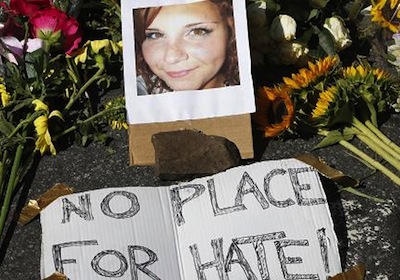
But, but . . . Heather Heyer, Brooks brings up.
The 900 hate groups didn’t run over Heather Heyer, an American woman who died after being struck by a car while protesting the Unite the Right rally in the streets of Virginia in 2017. An individual named James Fields will stand trial for that crime later this year. (And by using the logic that many of the SPLC supporters apply to the gun debate, the real blame needs to go to the Dodge Challenger that Fields drove; how many more must die before we ban Dodge Challengers?!)
If anyone is celebrating Heyer’s death, well, that is shameful. Deliberately running into someone with a car is a crime, regardless of the race and gender identity of the driver and the victim.
I’m not certain that plastering the deceased’s name and face all over the place in an emotionally manipulative showcase of grandstanding, moral posturing and furthering one’s own political agenda is something to be proud of either.
So, I criticize the Southern Poverty Law Center for its divisiveness, for preaching a message of tolerance but in actuality practicing a pattern of “our way or no way,” for perpetuating intolerance and division, for becoming, as another journalist recently described the group, “a machine for turning leftist hysteria into cash” and for a rationale laced with many contradictions.
That is my reaction. I hope it does not seem racist or bigoted.
I do believe that Brooks has a desire to help others in our country, so while I disagree with some of the tactics of her group and its followers, I recognize her service.
At the end of her presentation, she closed with a touching request for everyone to talk to their kids about race and our society and to convey being proud of your cultural heritage, stating that all parents have a responsibility to instruct the next generation in how they should treat others.
In summary, treat people right, listen to what others are saying (yes, sometimes even those different from you) don’t wait around for the government, the major political parties or the SPLC to do much to improve your life, and do your best to avoid being an abuser or a victim. Be the change, live like all lives matter, and love your neighbor!
___
I welcome replies from the Southern Poverty Law Center, and all other readers, and encourage them to avoid name calling and to say what they mean in a precise manner: bracken@boropulse.com













